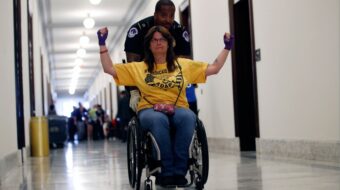
OAKLAND, Calif.—Bright and early Monday morning, some 2,000 psychologists, therapists, chemical dependency counselors, and social workers will be on the picket line outside Kaiser Permanente facilities across northern California and the Central Valley, demanding that the giant healthcare corporation provide its millions of enrolled patients the quality mental health services they urgently need.
The clinicians, represented by the National Union of Healthcare Workers, have been engaged in a years-long struggle to assure their patients receive quality care. As long ago as 2013, as the clinicians were struggling with Kaiser—the country’s largest nonprofit HMO—to increase staffing to a level letting them provide effective treatment at appropriate intervals, the state Department of Managed Health Care (DMHC) fined Kaiser $4 million for making patients wait four to 12 weeks between appointments.
The clinicians have continued that struggle ever since, including week-long strikes in 2018 and 2019. But this is the first time they have declared their strike is open-ended. Daily picket lines are scheduled from 6 a.m. to 2 p.m. at Kaiser locations starting Monday, Aug. 15, with lunchtime rallies featuring community leaders and Kaiser patients. Picketing locations will vary from day to day.
Though in past short-term strikes, Kaiser responded by cancelling appointments, at an oversight hearing held Aug. 10 by the state Senate’s Select Committee on Mental Health and Addiction, DMHC Director Mary Watanabe said Kaiser will be required to follow state law and either provide an appointment within its network, or “arrange for out-of-network care at the in-network rate.”

State Sen. Scott Wiener, D-San Francisco, chairs the Select Committee. In recent years, he has authored two bills strengthening state requirements for prompt mental health treatment, Senate Bill 855 and SB 221. As he opened the hearing, he told fellow legislators on the panel, and clinicians and patients’ family members waiting to testify, “We have in recent years dramatically strengthened our mental health parity laws in California, representing the fundamental notion that mental health care is no different than physical health care, and that we need to move away from the era of treating mental health issues as some sort of personal failing.”
Weiner told the hearing that representatives of health plans, including Kaiser, were invited but “none of them are participating; that was their decision.”
SB 221, which became effective July 1, requires that after an initial appointment, a follow-up visit must be scheduled within 10 business days.
Watanabe told the committee that even before SB 221 took effect, DMHC had begun a “non-routine survey” of Kaiser because from 2020 to 2021, the department’s Help Center had seen a 20% increase in complaints from Kaiser enrollees. She said her department conducts routine examinations of all health plans in the state every three years.
Jasmin Hakes told the committee that her now-adult daughter was first diagnosed with multiple serious mental illness challenges in 2013 and after becoming “very ill” three years ago, had tried twice to commit suicide, ending up on life support both times. But, Hakes said, despite the severity of her daughter’s illness and the specific legal requirements for care, they have repeatedly been informed that Kaiser does not have an available therapist on staff, and all contracted therapists are booked solid.
Kaiser therapist Sarah Soroken, who conducts initial triage appointments, said that despite SB 221’s entry into force, in her service area most patients with moderate to severe symptoms must wait more than three months even for their first therapy appointment, while those with mild to moderate symptoms call back months later, saying no providers were available in the external network.

The situation is taking such a toll on therapists, she said, “that what I observe is that more are leaving than are being hired, because the working conditions are such that therapists burn out, they’re not able to continue working in this sort of environment.”
“As clinicians,” Soroken said, “we have made proposal after proposal to Kaiser for greater investment in timely care, and Kaiser has rejected all of them. Now,” she said, “clinicians feel we have no other option but to strike. We don’t make that choice lightly, but as a last resort.”
Added fellow therapist Brandi Plumley, “the reason Kaiser clinicians are leaving is that we’re just exhausted. We’re understaffed, overworked, and the moral injury of having to look your patient in the eye and say, I’m sorry, I can’t see you again for eight or 12 weeks—that is beyond heartbreaking.”
Last year, Kaiser reported an $8.1 billion net profit, and it has $54 billion in reserves. Even so, the HMO staffs approximately one full-time-equivalent mental health therapist for every 2,600 members.
Last week, as the National Union of Healthcare Workers announced the Kaiser therapists were poised to start a strike on Aug. 15, NUHW President Sal Rosselli said, “Patients are getting ripped off while Kaiser’s coffers are bulging. We don’t take striking lightly, but it’s time to take a stand and make Kaiser spend some of its billions on mental health care.”










